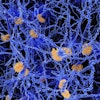
The U.S. Food and Drug Administration's (FDA) approval of Biogen and Eisai’s Alzheimer’s disease drug Leqembi is likely to drive changes in the apolipoprotein E (APOE) testing market, according to an article in GenomeWeb.
When the FDA awarded accelerated approval to Leqembi earlier this year, the agency advised doctors to consider testing for APOE4 to inform the risk of developing a key side effect. The advice was based on clinical data showing that four of the five patients who had symptomatic amyloid-related imaging abnormalities (ARIA) in a clinical trial had two copies of APOE4.
The advice fell short of a requirement to test for APOE4 status before starting patients on Leqembi, but the label could still drive more patients to get tested. However, there are gaps in the APOE testing and the lack of a support system.
Companies including 23andMe offer direct-to-consumer tests for APOE4, a genetic variant associated with increased risk of Alzheimer’s, but the FDA has yet to approve a test for assessing ARIA risk in patients taking Leqembi. The U.S. Centers for Medicare and Medicaid Services has not created a national coverage policy for APOE4 testing yet, and the testing is generally not covered by Medicare administrative contractors.
Rebecca Edelmayer, senior director of scientific engagement at the Alzheimer's Association, expects the situation to change down the line, noting that with Leqembi only winning approval this year, “we are in a new phase right now and a new era of treatment.”
“It's likely that as we move through changes in our healthcare system associated with these new and novel treatments coming to market, it is going to take some time for the system to shift in a manner to streamline not only the diagnostic process but also the implementation and delivery of these treatments,” Edelmayer said.
Increased access to tests is only one part of what could change. Access to counseling is also an issue. If more people get tested for APOE4, they, and by extension their relatives, will learn whether the variant is found in their families. The shift could lead to more people learning they may be at increased risk of Alzheimer’s disease, and some experts are concerned about the lack of counseling offered to them with testing.



















